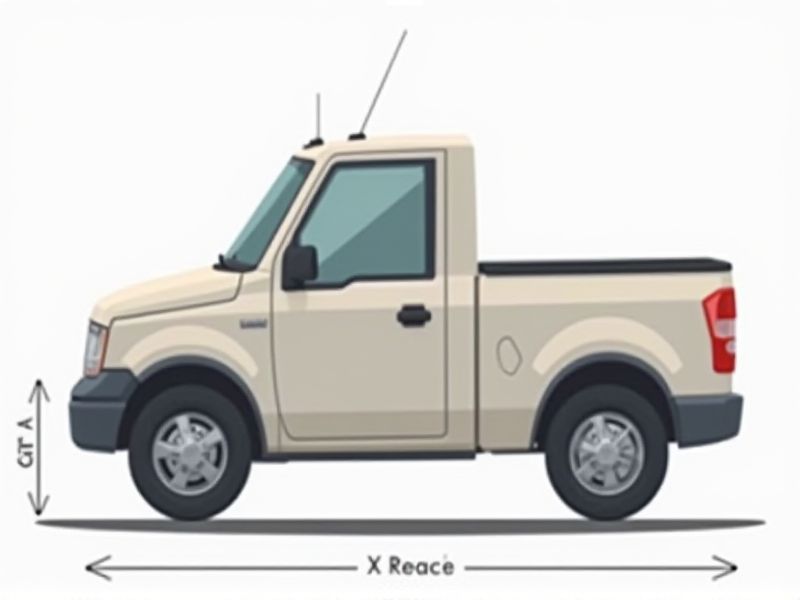
Pickup truck bed dimensions can vary depending on the make and model, but there are some standard size categories to consider when shopping or planning for cargo. Most full-size pickup trucks offer three main bed lengths: short beds (about 5.5 feet), standard beds (typically around 6.5 feet), and long beds (often 8 feet in length). The width between the wheel wells is generally about 4 feet, which is wide enough for standard plywood sheets. Knowing these common dimensions can help you choose the right truck for hauling, construction, or recreational needs.
Length
The standard lengths for pickup truck beds typically range from 5.5 feet to 8 feet, accommodating various cargo needs. A 5.5-foot bed is ideal for urban use, providing storage for everyday items while maintaining maneuverability. In contrast, an 8-foot bed offers maximum cargo capacity, making it suitable for transporting larger equipment or materials. Understanding these dimensions can help you choose the right pickup truck for your specific requirements.
Width
The standard width of a pickup truck bed typically ranges from 60 to 80 inches, with most models averaging around 66 inches. A wider bed enhances storage capacity, allowing for larger cargo items and improved accessibility when loading or unloading. For instance, popular models like the Ford F-150 and Chevrolet Silverado feature beds that are 5.5 to 8 feet long, providing versatile options for both personal and commercial use. When selecting a pickup truck, consider how the bed width aligns with your specific hauling needs to maximize efficiency and utility.
Depth
The standard depth of a pickup truck bed typically ranges from 18 to 22 inches, depending on the model and manufacturer. This depth is important as it impacts cargo capacity and accessibility, with deeper beds often accommodating larger loads. For example, a depth of 20 inches can facilitate the transport of standard-sized plywood sheets or hefty appliances with ease. When selecting a truck, consider how this depth meets your specific hauling needs, ensuring optimal functionality for your lifestyle.
Tailgate Height
The standard tailgate height for a pickup truck bed typically ranges from 28 to 34 inches off the ground, significantly impacting accessibility and usability. This height allows for easier loading and unloading of cargo, with most models designed to accommodate various tools and equipment. If you're considering a pickup for serious hauling, ensure your tailgate height aligns with your ergonomic needs and the height of your loading equipment. A tailgate that meets these standards enhances both functionality and safety during transportation.
Wheel Well Width
The standard wheel well width for pickup truck beds typically ranges from 44 to 50 inches, accommodating varying tire sizes and enhancing maneuverability. This width is crucial for owners looking to transport larger equipment or cargo securely, preventing damage during transit. In many models, ensuring an optimal wheel well width helps maximize payload efficiency while maintaining stability on rugged terrains. You should consider this measurement when choosing accessories like bed liners or toolboxes to ensure a proper fit.
Cargo Volume
The cargo volume of standard pickup truck beds typically ranges from 50 to 100 cubic feet, depending on the model and configuration. A full-size truck, such as the Ford F-150, offers a standard bed that can accommodate up to 77.4 cubic feet of cargo, while the shorter bed option may reduce this volume. Compact pickups, like the Toyota Tacoma, usually provide between 40 to 60 cubic feet, making them ideal for urban environments or lighter loads. When selecting a pickup, consider how cargo volume aligns with your hauling needs to ensure optimal utility and efficiency.
Bed Liner Options
When considering pickup truck bed liners, you have several options to enhance durability and protection. Spray-on bed liners, typically costing between $400 to $800, create a seamless, custom fit that adheres directly to your truck's surface. Drop-in bed liners, priced around $300 to $500, offer a removable solution that provides decent protection against scratches and dents. Rubber mat liners, which provide additional cushioning, can range from $150 to $300 and are ideal for preventing cargo shift while adding a layer of insulation against impact.
Tie-Down Points
Outfitting your pickup truck bed with reliable tie-down points is essential for securing cargo effectively. Standard tie-down points typically include recessed D-rings and integrated anchor systems, capable of handling loads up to 1,000 pounds each. Most modern trucks feature at least four tie-down points, strategically positioned to maximize cargo stability and prevent shifting during transport. Investing in sturdy, durable tie-down points enhances your truck's utility and ensures safer transport of all your goods.
Material Type
The standard pickup truck bed is commonly constructed from either steel or aluminum, with steel often offering superior strength and durability, while aluminum is favored for its lightweight properties and resistance to rust. Steel truck beds typically weigh between 300 to 500 pounds, depending on the gauge and type, whereas aluminum beds can weigh approximately 100 to 200 pounds less, enhancing fuel efficiency. Both materials provide varying levels of impact resistance, with steel being more prone to dents but easier to repair, while aluminum can sustain less damage but may be more expensive to replace if damaged. When selecting a pickup truck, consider how the material type of the bed aligns with your specific hauling needs and payload capacity requirements.
Load Capacity
The load capacity of pickup truck beds typically ranges between 1,000 to 3,000 pounds, depending on the make and model. Heavy-duty options, such as the Ford F-250 or RAM 2500, can accommodate payloads exceeding 3,000 pounds. You should consider the materials used in the bed construction, with high-strength steel and aluminum offering enhanced durability and longevity. Factor in additional features like built-in tie-downs and bed liners that can further optimize your truck's load-carrying efficiency.
